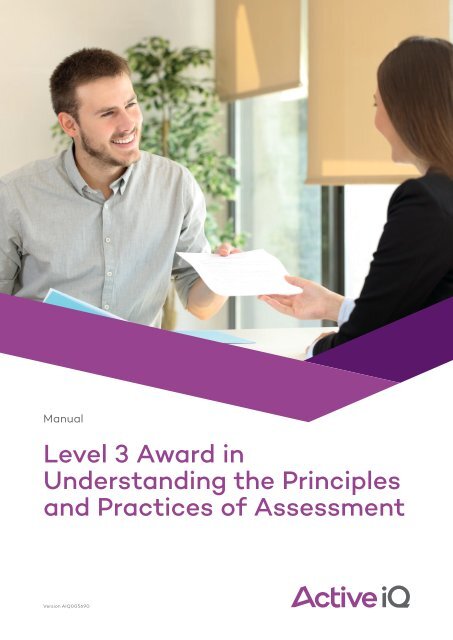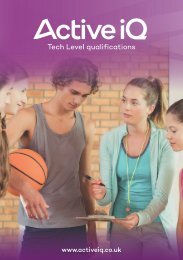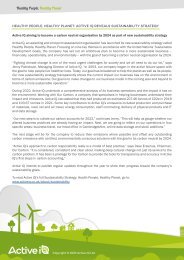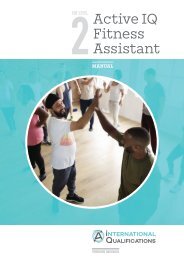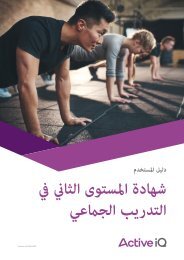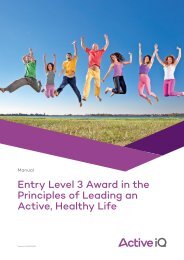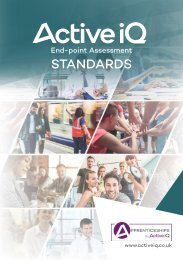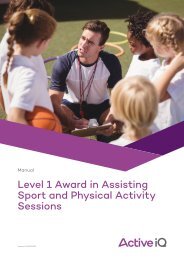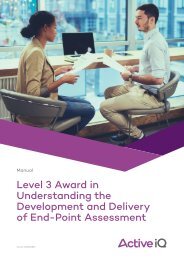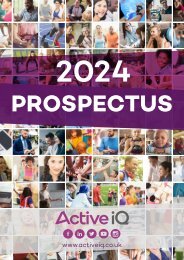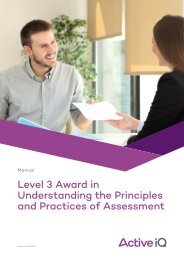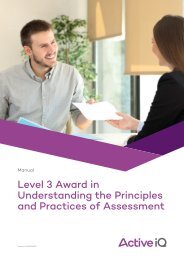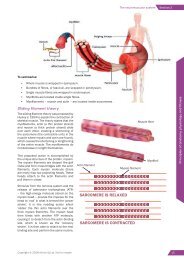Active IQ Level 3 Award in Assessing Vocationally Related Achievement (sample manual)
You also want an ePaper? Increase the reach of your titles
YUMPU automatically turns print PDFs into web optimized ePapers that Google loves.
Manual<br />
<strong>Level</strong> 3 <strong>Award</strong> <strong>in</strong><br />
Understand<strong>in</strong>g the Pr<strong>in</strong>ciples<br />
and Practices of Assessment<br />
Version A<strong>IQ</strong>005690
Understand<strong>in</strong>g pr<strong>in</strong>ciples<br />
and practice of assessment<br />
<strong>in</strong> education and tra<strong>in</strong><strong>in</strong>g<br />
Aim<br />
This unit exam<strong>in</strong>es the theory beh<strong>in</strong>d assessment, and how it can be implemented <strong>in</strong> a variety of methods<br />
appropriate to the context of the environment, subject matter and type of learn<strong>in</strong>g. Assessors make judgements<br />
and decisions based on evidence; however, it is important for the learner and others to be <strong>in</strong>volved throughout. We<br />
will also consider responsibilities, policies, procedures and legislation related to the role and the whole process.<br />
Learn<strong>in</strong>g outcomes<br />
At the end of this unit you will:<br />
• Understand types and methods of assessment used <strong>in</strong> education and tra<strong>in</strong><strong>in</strong>g<br />
• Understand how to <strong>in</strong>volve learners and others <strong>in</strong> the assessment process<br />
• Understand the role and use of constructive feedback <strong>in</strong> the assessment process<br />
• Understand requirements for keep<strong>in</strong>g records of assessment <strong>in</strong> education and tra<strong>in</strong><strong>in</strong>g<br />
• Understand the pr<strong>in</strong>ciples and requirements of assessment<br />
• Understand different types of assessment method<br />
• Understand how to plan assessment<br />
• Understand how to make assessment decisions<br />
• Understand quality assurance of the assessment process<br />
• Understand how to manage <strong>in</strong>formation related to assessment<br />
• Understand the legal and good practice requirements<br />
<strong>in</strong> relation to assessment.<br />
Copyright © 2019 <strong>Active</strong> <strong>IQ</strong> Ltd. Not for resale<br />
1
The pr<strong>in</strong>ciples, legal and good practice requirements of assessment<br />
Section 1<br />
Section 1: The pr<strong>in</strong>ciples,<br />
legal and good practice<br />
requirements of assessment<br />
The purpose of assessment <strong>in</strong> learn<strong>in</strong>g and<br />
development: functions, concepts and pr<strong>in</strong>ciples<br />
Assessment is a purposeful process to f<strong>in</strong>d out if learn<strong>in</strong>g has taken place. It is a way to evidence whether a learner<br />
has the knowledge and skills required, usually aga<strong>in</strong>st a syllabus of criteria or expected standards. It is a supportive<br />
process where the learner is encouraged to ask questions, seek feedback and be <strong>in</strong>volved positively throughout.<br />
Assessment can serve the follow<strong>in</strong>g functions:<br />
Motivate and<br />
encourage learners<br />
Determ<strong>in</strong>e<br />
effectiveness of<br />
programme<br />
Diagnose learner<br />
needs<br />
Acknowledge and<br />
certificate learn<strong>in</strong>g<br />
Assist <strong>in</strong> selection<br />
processes<br />
The overall purpose of assessment is to determ<strong>in</strong>e whether a person is competent based on a range of evidence<br />
and set aga<strong>in</strong>st specified criteria. It helps establish whether the standards have been met and enables qualifications<br />
to be awarded.<br />
Understand<strong>in</strong>g pr<strong>in</strong>ciples and practice of assessment <strong>in</strong> education and tra<strong>in</strong><strong>in</strong>g<br />
The start<strong>in</strong>g po<strong>in</strong>t for any assessment is the programme outl<strong>in</strong>e, guide or qualification syllabus usually provided by<br />
the award<strong>in</strong>g organisation.<br />
<strong>Award</strong><strong>in</strong>g organisations (such as <strong>Active</strong> <strong>IQ</strong>) are responsible for produc<strong>in</strong>g the syllabus for a qualification, <strong>in</strong>clud<strong>in</strong>g<br />
an assessment specification. This will <strong>in</strong>clude how the qualification should be assessed; this may cover the format,<br />
frequency, qualifications required by the assessors, and systems for implement<strong>in</strong>g <strong>in</strong>ternal and external quality<br />
assurance.<br />
ACTIVITY<br />
F<strong>in</strong>d out who the award<strong>in</strong>g organisation is for your subject area. Access their website to f<strong>in</strong>d the<br />
specifications / syllabus for the qualifications they offer and review the assessment strategy along with<br />
the policies and procedures they have. Familiarise yourself with the requirements so that you can be<br />
prepared once you start work<strong>in</strong>g with an education and tra<strong>in</strong><strong>in</strong>g provider.<br />
Copyright © 2019 <strong>Active</strong> <strong>IQ</strong> Ltd. Not for resale 3
The pr<strong>in</strong>ciples, legal and good practice requirements of assessment<br />
Section 1<br />
Valu<strong>in</strong>g reflective practice and cont<strong>in</strong>u<strong>in</strong>g professional development<br />
Reflective practice is important for the assessor. It is th<strong>in</strong>k<strong>in</strong>g about (or reflect<strong>in</strong>g on) what you did or the experience<br />
you had and decid<strong>in</strong>g from that what you would do the same or differently next time.<br />
Reflective practice requires a conscious effort to th<strong>in</strong>k about the experience and develop future ideas. All <strong>in</strong>dividuals<br />
<strong>in</strong>volved <strong>in</strong> the learn<strong>in</strong>g and development process can benefit from it.<br />
Gravells’ (2011) EDAR approach provides a simple mechanism to follow for reflection:<br />
Experience<br />
Describe<br />
Analyse<br />
Revise<br />
Experience – the assessment you gave and would like to improve or reflect on<br />
Describe – who was <strong>in</strong>volved, what happened, when and where it happened<br />
Analyse – th<strong>in</strong>k more deeply, th<strong>in</strong>k how and why it happened<br />
Revise – what would you do differently? What would you keep the same? Try it out next time<br />
Follow<strong>in</strong>g this method can allow an assessor to reflect on their own assessment practice and identify areas they<br />
may wish to change. Assessors can reflect on their assessment experiences <strong>in</strong> a variety of ways <strong>in</strong>clud<strong>in</strong>g simple<br />
templates, notebooks, evaluation forms, self-reflection logs, learn<strong>in</strong>g logs or diaries.<br />
Cont<strong>in</strong>ual professional development (CPD) is a means by which assessors can ma<strong>in</strong>ta<strong>in</strong>, improve and broaden<br />
their knowledge, skills and assessment practice. This can be achieved <strong>in</strong> many ways, <strong>in</strong>clud<strong>in</strong>g attend<strong>in</strong>g workshops,<br />
onl<strong>in</strong>e tra<strong>in</strong><strong>in</strong>g, conferences, shadow<strong>in</strong>g, buddy<strong>in</strong>g, mentor<strong>in</strong>g others or tak<strong>in</strong>g further qualifications. With respect to<br />
assessment, CPD is vital as standards and qualifications change, regulations are amended, and subject knowledge<br />
and skills are constantly evolv<strong>in</strong>g. Without CPD, an assessor risks not be<strong>in</strong>g occupationally competent and be<strong>in</strong>g<br />
unable to perform their role. Most award<strong>in</strong>g organisations and tra<strong>in</strong><strong>in</strong>g providers will require evidence of regular CPD<br />
to ma<strong>in</strong>ta<strong>in</strong> the standards, licence or qualifications needed to assess.<br />
CPD:<br />
✓<br />
✓<br />
✓<br />
ACTIVITY<br />
Develops how to cope positively and confidently with assessment challenges and changes.<br />
Showcases assessors’ achievements and enhances credibility.<br />
Def<strong>in</strong>es, monitors and achieves career goals.<br />
Reflect on your current experience as a new assessor us<strong>in</strong>g the EDAR approach described above. Include<br />
the opportunities you will take over the com<strong>in</strong>g months to develop your knowledge, skills and practice.<br />
Notes<br />
Understand<strong>in</strong>g pr<strong>in</strong>ciples and practice of assessment <strong>in</strong> education and tra<strong>in</strong><strong>in</strong>g<br />
Copyright © 2019 <strong>Active</strong> <strong>IQ</strong> Ltd. Not for resale 11
Plann<strong>in</strong>g assessment<br />
Section 3<br />
Section 3: Plann<strong>in</strong>g assessment<br />
As with any aspect of learn<strong>in</strong>g and development provision, plann<strong>in</strong>g is essential <strong>in</strong> ensur<strong>in</strong>g a smooth, efficient and<br />
effective assessment process.<br />
To be effective, the assessment plan needs to consider the follow<strong>in</strong>g factors:<br />
Involv<strong>in</strong>g the learners Initial assessment Assessment method and type<br />
<strong>Award</strong><strong>in</strong>g organisation requirements<br />
Environmental conditions<br />
Date, time and duration Number and ability of learners Resources and materials<br />
Staff / support availability and expertise<br />
Did you know?<br />
Initial assessment can….<br />
Type of evidence required<br />
Help create an <strong>in</strong>dividual learn<strong>in</strong>g plan.<br />
Ensure learners are tak<strong>in</strong>g the right programme at the right level.<br />
Identify any specific support needs.<br />
Identify learn<strong>in</strong>g preferences.<br />
Inspire and motivate learners.<br />
Involve learners, giv<strong>in</strong>g them confidence to set their own targets.<br />
To be effective, an assessment plan should address the follow<strong>in</strong>g:<br />
Subject, qualification and specification<br />
1. The learner must be <strong>in</strong>volved <strong>in</strong> the plann<strong>in</strong>g of assessments and agree with the plan. They need to understand<br />
what is expected of them and be given the best opportunity for success.<br />
2. Plans must be clear and cover the required assessment criteria. They should show holistic assessment<br />
where possible.<br />
3. Plans should cover a variety of assessment methods which are appropriate for the criteria be<strong>in</strong>g assessed.<br />
4. Plans should <strong>in</strong>clude dates, times, actions that need complet<strong>in</strong>g, required resources, and details of others<br />
<strong>in</strong>volved <strong>in</strong> the process.<br />
Understand<strong>in</strong>g pr<strong>in</strong>ciples and practice of assessment <strong>in</strong> education and tra<strong>in</strong><strong>in</strong>g<br />
Copyright © 2019 <strong>Active</strong> <strong>IQ</strong> Ltd. Not for resale 17
Plann<strong>in</strong>g assessment<br />
Section 3<br />
Risks associated with assessment<br />
Environment: The assessor should consider the nature of<br />
the assessment environment such as appropriate heat<strong>in</strong>g,<br />
ventilation, light<strong>in</strong>g and fire exits, as well as more hazardous<br />
environments for practical environments such as gymnastics<br />
halls or swimm<strong>in</strong>g pools.<br />
Environment<br />
Assessment<br />
risks<br />
Activities: The assessor should pay attention to the<br />
complexity of the tasks such as the length of time taken,<br />
whether learners are sitt<strong>in</strong>g or stand<strong>in</strong>g, concentration<br />
levels required and duration <strong>in</strong> the environment. Low-risk<br />
tasks like written exams will pose less risk than complex<br />
practical tasks such as weightlift<strong>in</strong>g demonstrations or<br />
mix<strong>in</strong>g chemicals.<br />
Activities<br />
People<br />
Pressure<br />
People: This risk presents the largest variable and the one<br />
most difficult to control; what is low risk to one <strong>in</strong>dividual may be<br />
high risk to another. Age, fitness, gender and skill levels all pose<br />
a risk to physical or practical assessment, for example. More subtle<br />
differences, such as familiarity with an assessment environment, or the<br />
effect of assessment on stress, can also affect the assessment process. Other people <strong>in</strong>volved or exposed to the<br />
assessment process can pose a risk if known to the learner or assessor, or if roles and responsibilities are not<br />
clearly def<strong>in</strong>ed and understood.<br />
Pressure: Undue psychological pressure on the learner can risk affect<strong>in</strong>g the quality of the assessment process,<br />
such as assess<strong>in</strong>g an <strong>in</strong>dividual who is not yet ready, sett<strong>in</strong>g unrealistic timescales, not adapt<strong>in</strong>g to reasonable<br />
adjustments, special considerations or <strong>in</strong>dividual needs. Pressure can also affect the assessor, with high numbers<br />
of learners to assess, pressure to meet atta<strong>in</strong>ment targets or fund<strong>in</strong>g, or pressure from the learner’s employers.<br />
Effective<br />
communication<br />
Careful<br />
plann<strong>in</strong>g<br />
Situations that could pose a risk <strong>in</strong>clude:<br />
Lower risk<br />
• A lack of confidence <strong>in</strong> the assessor to make correct decisions.<br />
• A lack of standardisation activities across the assessor workforce.<br />
• A learner copy<strong>in</strong>g another’s work (plagiarism).<br />
• An assessor not consider<strong>in</strong>g a learner’s needs.<br />
• Us<strong>in</strong>g <strong>in</strong>appropriate assessment activities.<br />
• Assessors us<strong>in</strong>g lead<strong>in</strong>g questions or do<strong>in</strong>g the learners’ work for them.<br />
• <strong>Award</strong><strong>in</strong>g organisations prescrib<strong>in</strong>g unsuitable assessment methods.<br />
• Employers not be<strong>in</strong>g supportive of assessment <strong>in</strong> the workplace.<br />
• Unhelpful and negative feedback to the learner.<br />
• Favouritism or bias towards selected learners.<br />
• Learners not be<strong>in</strong>g registered with the award<strong>in</strong>g organisation prior to assessment.<br />
• Unwelcome disruptions and <strong>in</strong>terruptions when assess<strong>in</strong>g.<br />
Understand<strong>in</strong>g pr<strong>in</strong>ciples and practice of assessment <strong>in</strong> education and tra<strong>in</strong><strong>in</strong>g<br />
Copyright © 2019 <strong>Active</strong> <strong>IQ</strong> Ltd. Not for resale 19
Keep<strong>in</strong>g records and manag<strong>in</strong>g <strong>in</strong>formation<br />
Section 6<br />
Benefits of feedback<br />
Creates opportunities for clarification and further discussion<br />
Emphasises progress rather than failure<br />
Gives learners confidence and motivation<br />
Identifies further learn<strong>in</strong>g opportunities and actions<br />
Question<strong>in</strong>g<br />
Question<strong>in</strong>g provides a highly effective method for the learner’s journey and for the assessment process. It helps to<br />
establish whether the learner has the underp<strong>in</strong>n<strong>in</strong>g knowledge and understand<strong>in</strong>g of particular assessment criteria.<br />
The purpose of question<strong>in</strong>g is to allow your learner to consider their achievements and answers before it becomes<br />
assessor-led. Ask<strong>in</strong>g open and prob<strong>in</strong>g questions allows the learner to demonstrate their own knowledge, provide<br />
their own thoughts and <strong>in</strong>sight, and to reflect on what they feel they have achieved and why and how they feel they<br />
can cont<strong>in</strong>ue to improve.<br />
Top tips<br />
Top tips for question<strong>in</strong>g:<br />
1. Allow enough time.<br />
2. Ask open questions: who, what,<br />
where, why, when, how?<br />
3. Be aware of your postures, gestures<br />
and body language when ask<strong>in</strong>g<br />
questions and receiv<strong>in</strong>g responses.<br />
4. Be conscious of dialect, tone, pitch<br />
and volume of your voice.<br />
5. Don’t ask more than one question<br />
at a time.<br />
6. Involve everyone (nom<strong>in</strong>ated<br />
question<strong>in</strong>g) if <strong>in</strong> a group.<br />
7. Use active listen<strong>in</strong>g skills.<br />
8. Use eye contact and names.<br />
Understand<strong>in</strong>g pr<strong>in</strong>ciples and practice of assessment <strong>in</strong> education and tra<strong>in</strong><strong>in</strong>g<br />
9. Ma<strong>in</strong>ta<strong>in</strong> learners’ comfort zone by<br />
be<strong>in</strong>g <strong>in</strong> a separate room, or away<br />
from others, if appropriate.<br />
10. Watch and respond to your<br />
learners’ reactions.<br />
Copyright © 2019 <strong>Active</strong> <strong>IQ</strong> Ltd. Not for resale 29
THE PURPOSE OF ASSESSMENT<br />
Diganose<br />
learner needs<br />
Motivate and<br />
encourage<br />
learners<br />
Determ<strong>in</strong>e<br />
effectiveness<br />
of programme<br />
Assist <strong>in</strong><br />
selection<br />
processes<br />
Acknowledge<br />
and certificate<br />
learn<strong>in</strong>g<br />
RESPONSIBILITIES OF<br />
AN ASSESSOR<br />
Review of<br />
progress<br />
Initial<br />
assessment<br />
Assessment<br />
plann<strong>in</strong>g<br />
Assessment<br />
decision and<br />
feedback<br />
Assessment<br />
activity<br />
Copyright © 2019 <strong>Active</strong> <strong>IQ</strong> Ltd. Not for resale


